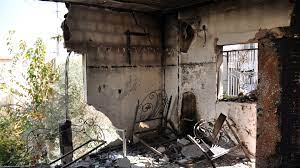WEST BANK (Agencies): In Umm Yousif’s neighbourhood, nearly every home and car is riddled with bullet holes and broken windows after what residents describe as a “massacre”. The children here are not playing with marbles, but with the bullet casings strewn across the tight alleyways and adjacent rooftops following a deadly Israeli raid on Thursday in the Jenin refugee camp.
“What we lived through was not normal. There was no safe place,” Umm Yousif told Al Jazeera the day after the attack, the bloodiest in the Israeli-occupied West Bank in years. “All the glass in my house shattered. We were all lying on the floor for two hours while there were sounds of explosions above our heads,” said the 47-year-old mother of four children. “We were expecting to die at any second.”
Nine residents, including two children, were killed during the Israeli assault that revived memories from 2002 when another large-scale raid and confrontations turned Jenin into a symbol of Palestinian resistance. A tenth person succumbed to his wounds on Sunday, while several others remain hospitalised after being wounded by live ammunition. Five of the 10 Palestinians killed were said to be armed resistance fighters, while the five others were unarmed civilians, according to residents. During the raid, Israeli forces in a military vehicle ran over and killed a 16-year-old child, according to a civil society group. A 61-year-old mother of six was also shot dead through her bedroom window after she had just finished praying.
Palestinian officials said Israeli forces also shot at ambulance vehicles, preventing them from advancing to treat the wounded, and fired tear gas towards the Jenin public hospital that seeped into the children’s ward, which Israeli officials denied was intentional. The largest Israeli military raid on the Jenin refugee camp in more than 20 years took place just before 7am (05:00 GMT). Israeli undercover forces dressed as civilians entered the camp in private vehicles with Palestinian plate numbers, surveillance videos showed.
Shortly after, they were backed up by dozens of soldiers who snuck into the camp in a large Palestinian dairy company truck. In a joint operation with Israeli intelligence and police, the army surrounded a home in the camp’s Joret al-Dahab neighbourhood – where three resistance fighters were taking shelter – and launched a surprise attack on it with anti-tank missiles and explosives. The house was almost completely destroyed and caught fire. The men inside it – Mohammad Soboh, 30, and brothers Nour al-Din and Mohammad Ghneim, 28 and 25 respectively – were killed.
Another fighter, Izz al-Din Salahat, 21, was shot dead up the street from the house, as he was firing back at soldiers. Armed clashes ensued with Palestinian fighters for several hours before the Israeli forces withdrew, leaving behind them a trail of blood and destruction – and a heavy toll on residents. “In 2002, 50 Palestinians were martyred over 13 days. On Thursday we had nine martyrs in one day,” 28-year-old resident Mahmoud Salawneh told Al Jazeera.
“They put us in a state of horror. The army was shooting left and right – everyone was a target – from kids to elderly people,” he said. The Israeli military justified the operation by claiming the raid was planned to detain Islamic Jihad fighters. The Jenin refugee camp is home to more than 22,000 Palestinians who were expelled from their original homes in 1948 during the Nakba, or catastrophe – the ethnic cleansing of Palestine by Zionist militias to create the state of Israel. On April 9, 2002, during the second mass Palestinian uprising (Intifada), Israeli forces backed by fighter jets invaded the camp with more than 150 armoured tanks and bulldozers. A battle with resistance fighters ensued over more than 10 days, in which at least 52 Palestinian civilians and fighters, and 23 Israeli soldiers, were killed.
During that raid, the Israeli army destroyed more than 400 homes and severely damaged hundreds of others, displacing over a quarter of the population of the camp, which was later rebuilt by the United Nations. “It took me back 20 years ago – to when I was a kid. This was like the invasion,” 35-year-old Ahmad Mousa told Al Jazeera of Thursday’s raid. The walls of his home and his car are riddled with bullet holes. “They were shooting at unarmed people, destroying property with tractors, Energa grenades,” said Mousa, who shares the residence with 14 family members, including seven children.
Another resident, Diana Qreini who is the mother of five children, said her home was hit with bullets from three different directions, piercing through her salon and her children’s bedrooms. “I don’t care about the house or myself. I care about my kids. I’m just glad my kids are safe – they could have been killed,” the 35-year-old said in a strained voice, attempting to hold back her tears. “Occupation soldiers shot directly at me through the window when I tried to move the curtain,” she told Al Jazeera.
While policies by the Palestinian Authority and Israel after the end of the second Intifada in 2005 largely led to the dismantling of armed resistance in the occupied West Bank, fighters in Jenin began re-organising in the wake of the May 2021 popular Palestinian uprising, which began with protests in Sheikh Jarrah in occupied East Jerusalem and saw another Israeli bombardment of the besieged Gaza Strip. The creation of the Jenin Brigades, a small group of cross-factional fighters focused on deterring Israeli forces and protecting the camp, led to similar groups appearing in a number of cities, villages and refugee camps in the northern occupied West Bank, a phenomenon Israel has been attempting to crush with near-daily raids and killings of Palestinians for more than a year.







